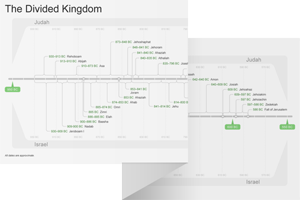5:1 O daughter of troops The reference to troops indicates that Jerusalem has had a long history of warfare.
a siege he puts against us In ancient times, heavily fortified cities like Jerusalem were taken only after long sieges.
against us The inhabitants of Jerusalem.
rod A club used for discipline.
on the cheek A form of humiliation.
the ruler of Israel Probably King Zedekiah, who reigned from 597–586 bc.
who reigned from 597–586 bc.
5:2 O Bethlehem Ephrathah Bethlehem was a very small village at the time of Micah, with a population of only a few hundred.
was a very small village at the time of Micah, with a population of only a few hundred.
Bethlehem (“house of bread”) Ephrathah (“fruitful”) is located five miles south of Jerusalem in the Judaean hill country. The region is known as Ephrath, hence the secondary designation. Bethlehem Ephrathah was the birthplace of David and Jesus (1 Sam 17:12; Matt 2:1). |
too small Bethlehem was located in the territory given to the tribe of Judah; however, it was not significant enough to be listed among the cities of Judah when the land was divided in the time of Joshua.
from you one will go out The Gospel of Matthew appeals to this verse regarding the birth of the Messiah in Bethlehem (see Matt 2:1–6).
from ancient days The Messiah existed from the beginning of time (compare John 1:1). Micah claims this Messiah, who existed from old, will shepherd the people of Israel and judge between people and nations.
5:3 he will give them up Yahweh will abandon the Israelites until their time of suffering is over.
she who is with child has given birth Judah is in birth pains for a purpose: The Israelites, God’s people, might be scattered around the world, but the Messiah will come forth from them (compare Isa 54:1). After a period of anguish, the Messiah will gather and lead God’s people. The Gospel of Matthew draws on these verses, showing that the birth of Jesus inaugurates the culmination of the promises in Micah 5 (Matt 2). The struggles of the nation ultimately result in the joy and reign of Jesus.
will return The Hebrew word for returning is used here to indicate repentance as well as physical return.
5:4 shepherd See note on Micah 2:12. The idea of a king as the shepherd and leader of his people is a common motif in the ancient Near East. See note on Jer 2:8.
and leader of his people is a common motif in the ancient Near East. See note on Jer 2:8.
he will be great unto the ends of the earth All the nations of the earth will submit to the Messiah’s authority (see Zech 14:9; compare Matt 24:14).
5:5 And this one will be peace The Messiah’s reign will be characterized by peace (see Micah 4:3–4).
the Assyrian People from Assyria, which claims Nimrod as its founder (see Gen 10:11).
he comes into our land At the time of Micah’s prophetic activity, the Assyrians dominated northern Mesopotamia.
our land Refers to Israel.
he treads The Hebrew term here is the same word used of Yahweh treading on the high places of the earth in Micah 1:3.
our fortresses Refers to citadels or fortified towers.
seven shepherds and eight leaders of men An example of number parallelism, a common poetic literary device representing many (see Job 33:29; Psa 62:11; Prov 6:16; 30:15, 18; Eccl 11:2; Amos 1:3; 2:1).
5:6 they will shepherd the land of Assyria See note on Micah 5:4. Refers to those mentioned in v. 5.
Nimrod A famous warrior and hunter who founded several cities in northern Mesopotamia, including Nineveh and Calah (Gen 10:8–12).
he will rescue That is, the “ruler” of Micah 5:2.
5:8 a lion among the wild animals of the forest Just as a lion dominates the beasts of the forest, the Israelites who live among the nations will be in a position of incredible strength, even though they are greatly outnumbered.
5:9 Your hand The Hebrew word for “hand” is used here as a symbol of authority. See Isa 41:10 and note.
5:10 in that day The day when the Messiah, the ruler described in Micah 5:2, rules over the land of Israel. See note on 2:4.
I will destroy your chariots When the Messiah comes, Yahweh will remove horses and chariots from Israel. These instruments of war will no longer be needed because the nation will ultimately experience peace (compare 4:3–4; 5:5).
5:12 sorceries Such activity would have fallen under the category of divination, which was prohibited in Israel (Deut 18:10–14).
5:13 I will cut off your idols Idols were commonly carved from wood or stone.
your stone pillars Sacred objects representing deities. They were typically made out of stone or wood.
5:14 Asherahs A wooden pole planted in honor of the Canaanite goddess Asherah. See note on Exod 34:13.
5:15 the nations who did not obey Refers to the nations that have not followed Yahweh’s commands concerning Israel (see Gen 12:3).

|
About Faithlife Study BibleFaithlife Study Bible (FSB) is your guide to the ancient world of the Old and New Testaments, with study notes and articles that draw from a wide range of academic research. FSB helps you learn how to think about interpretation methods and issues so that you can gain a deeper understanding of the text. |
| Copyright |
Copyright 2012 Logos Bible Software. |
| Support Info | fsb |
 Loading…
Loading…



 Bethlehem Ephrathah
Bethlehem Ephrathah